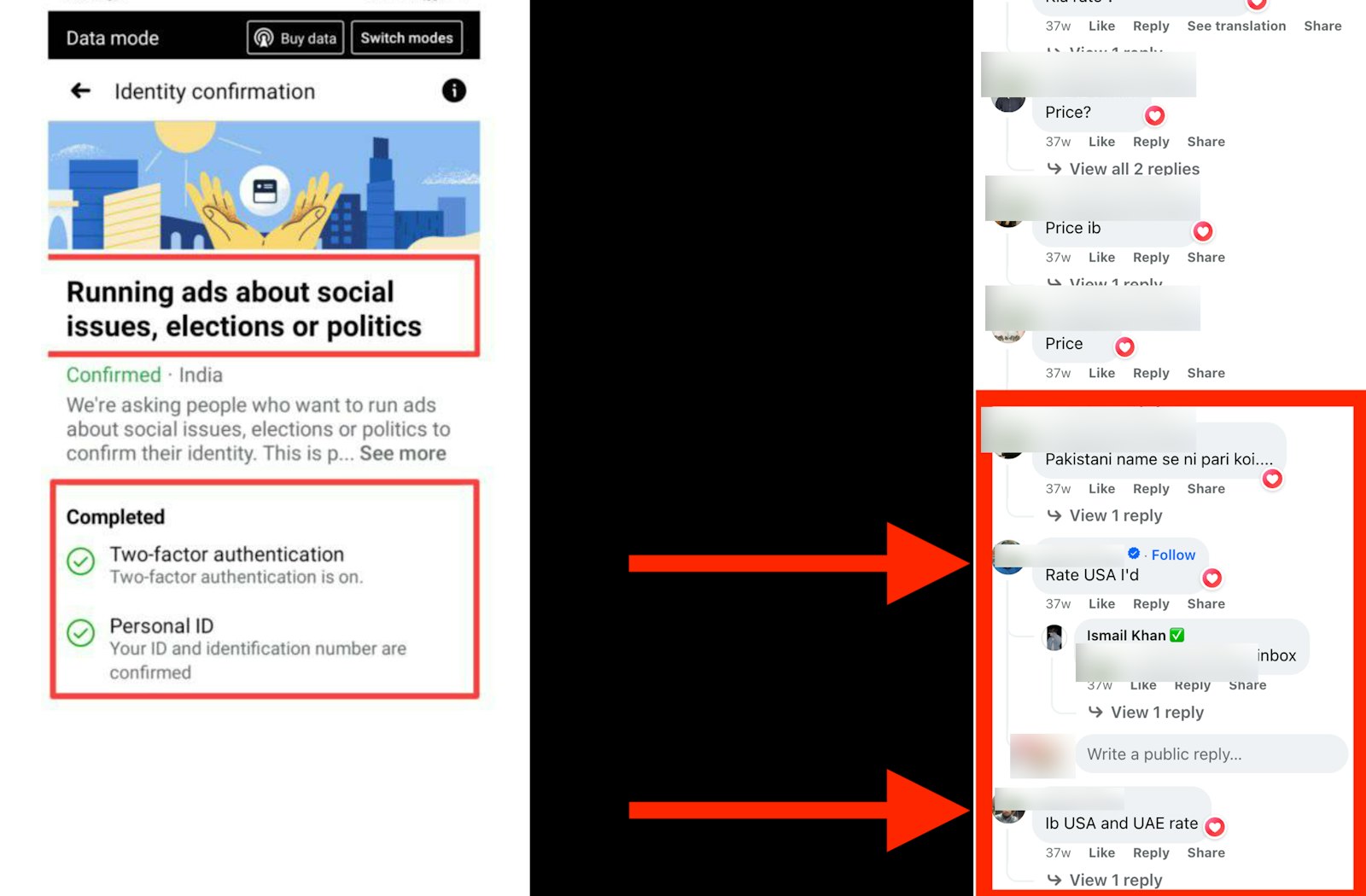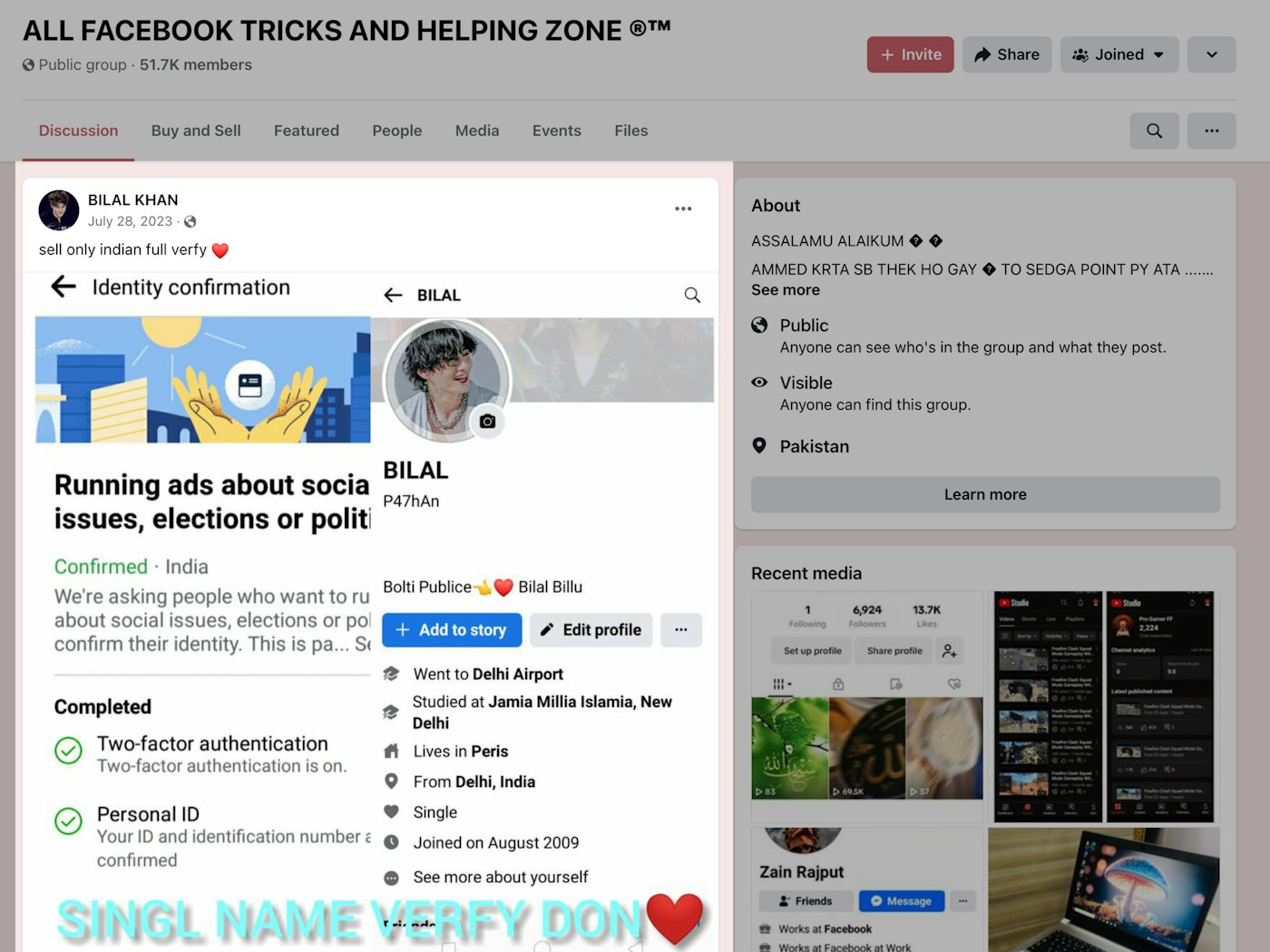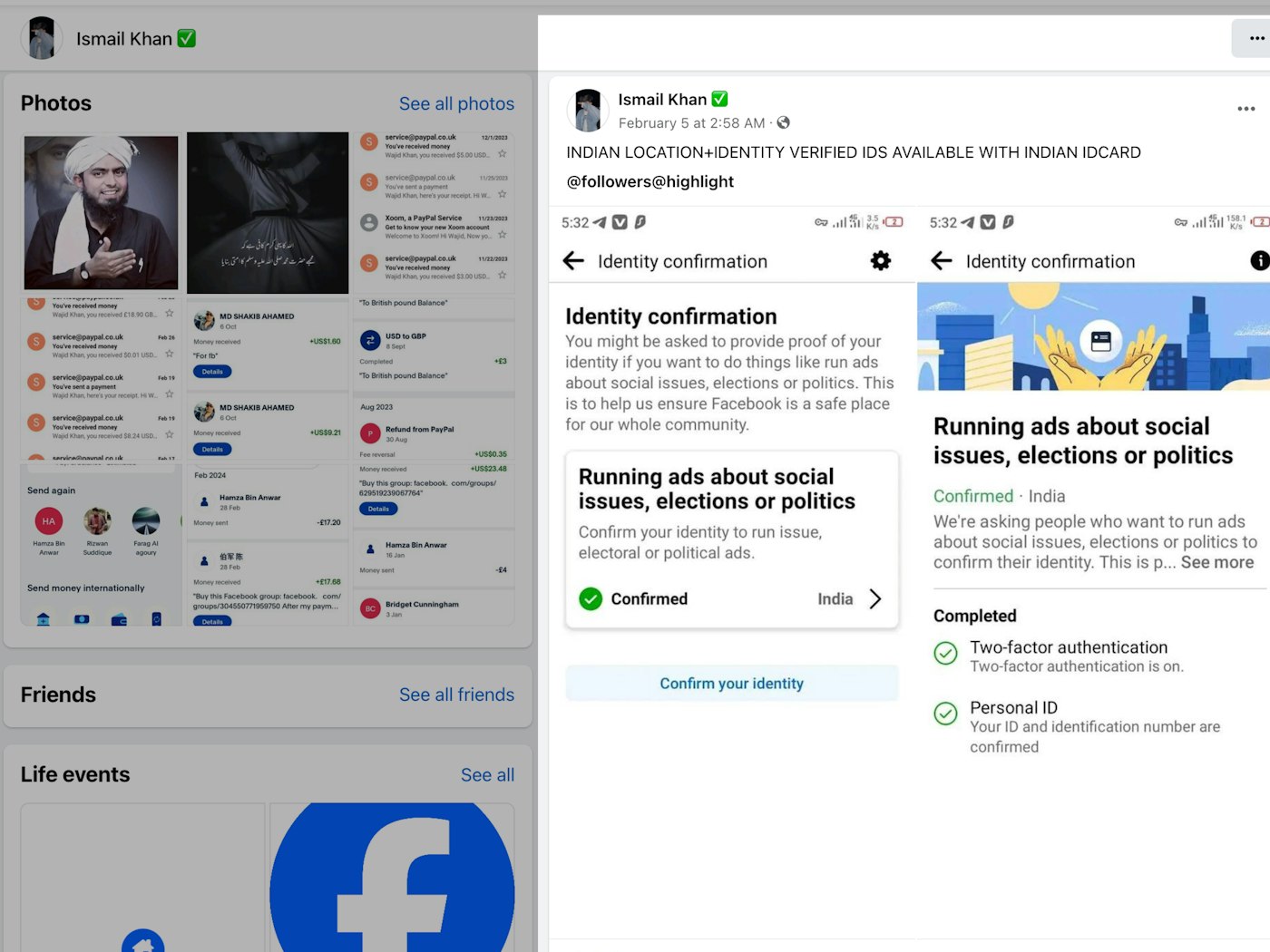Facebook is allowing users to buy and sell Facebook accounts that can run political ads in India, raising concerns they could be used for election interference in that country, the Tech Transparency Project (TTP) has found.
Facebook parent company Meta’s policies ban the sale, purchase, or exchange of accounts. But TTP found multiple Facebook users selling accounts they said are authorized to advertise on politics and election issues in India.
TTP did not engage with the sellers and could not determine how many accounts they sold or how those accounts are being used. But the illicit trade could have implications for India’s six-week general election, which is underway now and runs until June 1.
Facebook has a history of allowing election interference via fake accounts, most famously during the 2016 U.S. election campaign, when Russian operatives using stolen identities purchased ads on Facebook to promote Donald Trump and stoke political divisions. The accounts identified by TTP appear to be tailor-made for the same kind of activity in India.
TTP has previously reported on Facebook’s thriving black market for accounts that have the ability to run ads on the platform. In November 2022, our researchers identified more than 100 Facebook groups where users bought and sold Facebook “business manager” accounts that are equipped to run multiple ad campaigns, including political ads.
Now, with India and some 80 other countries holding elections this year, Facebook’s inability, or unwillingness, to curb this black market could create new opportunities for election interference around the world. That includes the U.S. elections in November.
Meta declined to comment on TTP's findings.
‘Accounts available’
After facing a firestorm of criticism for allowing Russians to interfere in the 2016 U.S. election, Facebook began requiring account administrators to submit a government-issued ID and a residential mailing address to get authorized to run political ads.
That process remains a key component of Meta’s effort to show it is taking action to protect elections. According to the company’s current election integrity page, “All ads about social issues, elections or politics are held to a higher standard of authenticity and transparency on Facebook and Instagram.”
But Facebook appears to be allowing users to simply sell accounts that have received approval to run political ads, undermining the company’s promises to promote election integrity. Anyone who buys these accounts would have the ability to run political ads under the name of a different person or organization.
TTP examined whether black market sellers on Facebook are offering accounts for political advertising in India, which is now holding the world’s largest democratic election. We found multiple examples.
In June 2023, one seller posted in a Facebook group about “INDIAN VERIFIED ACCOUNTS AVAILABLE,” along with screenshots showing Facebook accounts that are authorized to run ads about “social issues, elections, or politics.” The post said the accounts come with an ID card, presumably the one used to verify them.
This violates Meta’s Community Standards, which state that users cannot “attempt to or successfully sell, buy, or exchange” accounts. The company’s policies also bar users from misrepresenting themselves, which would apply to anyone who purchased these accounts and used them under the guise of a false or stolen identity.
This seller offered Facebook accounts that can run ads on social issues, elections or politics in India.
This seller offered Facebook accounts that can run ads on social issues, elections or politics in India.
In the same post, the seller offered “UNLIMITED IDS” and “ALL COUNTRY IDS AVAILABLE,” suggesting that various forms of identification were also for sale. The post received dozens of replies, including from users asking for rates in other countries, including the U.S.
Meta’s commerce policy bans the “buying or selling of real or fake documents,” including passports, IDs, or certificates. The company’s Community Standards on privacy also prohibit the sharing of identity documents and personal ID numbers.
The seller posted his message in a public Facebook group called Digiverse Task Force. The group, which shows it was created in February 2022 and has more than 34,000 members, was filled with messages from people looking to buy or sell Facebook, Instagram, and Gmail accounts. The group’s history showed it was originally called Facebook Free Earnings Guide.
Thriving market
TTP found similar activity in other public Facebook groups.
In one group called “ALL FACEBOOK TRICKS AND HELPING ZONE®©™,” a seller offered Facebook accounts in July 2023, with screenshots showing the accounts were authorized to run political and election ads in India. The Facebook group—which gave its location as India, Pakistan and the Philippines, and had more than 51,000 members—hosted a thriving trade in all things social media, including fake Instagram followers, fake WhatsApp numbers, and American IDs. It appears to have been deleted since TTP conducted its initial research, but at least a dozen other groups with the same name continue to operate on Facebook.
A user in another group called “Facebook Ads And Google Ads Expert,” with more than 102,000 members, posted in November 2023 that they needed a “fb account that is eligible to run social, election and political ads in India with a Good spend limit to add prepaid funds.” Multiple members of the group replied with offers to help, including one who gave his location as Vietnam—an indication of the borderless nature of this black market.
In a group called FREE COMMAND BY SAMI TRICKER, a user who posted about Indian accounts for sale in December 2023 had a “top contributor” badge, which Facebook awards to people for “being one of the most active participants” in a group. Meta evidently handed out this designation even though the group in question hosts a bustling trade in Facebook accounts, WhatsApp accounts, and Indian IDs.
Sellers often posted screenshots to show the accounts were approved to run election ads in India.
Sellers often posted screenshots to show the accounts were approved to run election ads in India.
The sellers identified by TTP regularly posted screenshots that showed the accounts were approved to run political and election ads in India. Meta has boasted about the ability of its automated systems to understand text in images, but did not appear to take action against these posts that clearly violated its policies.
As noted previously, TTP did not interact with the account sellers and could not verify the offers were real. But Forbes, which covered TTP’s November 2022 report about Facebook’s black market for business manager accounts, did obtain an account from a black market seller and determined that it appeared capable of running ads.
Forbes also reported that some of the documents for sale in these black market groups appeared to belong to real people—and interviewed one of them, who recalled accidentally posting a photo of his passport to Facebook five years earlier.
Election integrity
Meta has been keen to show the steps it is taking to protect global elections this year, with Nick Clegg, the company’s president of global affairs, stating, “No tech company does more or invests more to protect elections online than Meta.”
The company has been under particular pressure in India. A series in the Washington Post last year reported that India’s ruling Bharatiya Janata Party (BJP) worked with a network of trolls to spread incendiary content about opponents on Meta’s WhatsApp and that Meta was often reluctant to take action against the BJP or its allies over policy violations.
After reports in March 2022 that Facebook gave the BJP a better deal on ads than other political parties in India and allowed “ghost” advertisers to boost the BJP without disclosing their identities or affiliation, Meta published a lengthy statement about its commitment to “free and fair elections in India," touting its advertising policies and political ad transparency efforts.
But by allowing the black market sale of ad-enabled accounts on its platform, Meta is opening up more opportunities to manipulate India’s elections.
TTP found that sellers on Facebook have continued to hawk Indian accounts in the months immediately preceding the country’s historic vote.
In February 2024, one user posted in a Facebook group called Cracking World that he had “unlimited” accounts approved to run political ads in India. The user’s Facebook page, which gave his location as Mumbai, India, stated that he is an “All Typ Facebook Account Seller.” The Cracking World Facebook group, which was created in 2022 and has more than 45,000 members, featured dozens of posts offering Facebook and other social media accounts for sale.
The first seller mentioned in this report, who posted in a Facebook group about “INDIAN VERIFIED ACCOUNTS AVAILABLE,” used his personal Facebook page to make a similar offer in February 2024. The about section of the page gives its location as Multan, Pakistan, which is noteworthy given the user is selling Indian accounts. The page’s cover photo is an image of Pakistan’s former Prime Minister Imran Khan.
This seller offered accounts in February 2024, just months before the start of India's general election.
This seller offered accounts in February 2024, just months before the start of India's general election.
In a potentially ominous sign for the November U.S. election, one user identified by TTP posted a message in January 2024 that read, “Need USA verified facebook accounts for politics?” The user’s account gave his location as Wallasey, England, and listed his occupation as selling Facebook business manager accounts—which is prohibited by Meta.
The user posted the message in a public Facebook group called “✔️Verified BM and FB Accounts Trusted Market ✔️” and on his personal Facebook page, getting positive replies from multiple users, including some in other countries. One reply came from a user who gave his location as Pakistan and had a Meta Verified blue checkmark next to his name. Meta (following the lead of Elon Musk’s X) turned the blue checkmark into a paid subscription service last year.
This user offered Facebook accounts capable of running political ads in the U.S.
This user offered Facebook accounts capable of running political ads in the U.S.
Conclusion
Despite years of claims that it is protecting election integrity, Meta appears to have a major blind spot with the black market for ad-approved accounts on its platform.
It is easy to see how bad actors could use accounts like these, under fake or stolen identities, to amplify disinformation or incendiary messages in India and dozens of other countries that are holding elections this year, including the U.S.
In theory, Meta bans the sale of these accounts. But as we’ve seen in so many other areas, the company often lacks effective enforcement of its policies.
Last year, Meta removed a China-based network of Facebook accounts that impersonated Americans having political discussions, which the company called a warning sign of the threats to elections around the world.
But until Meta takes action to dismantle its black market for ad-enabled accounts—which TTP flagged more than a year ago—it is leaving the door open to election interference.
















